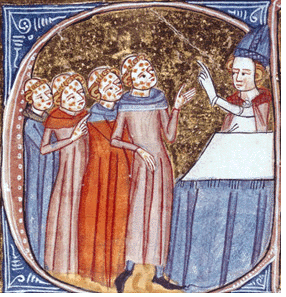
This happened awhile ago, but I still laugh whenever I think about it. One time Meg and I went to a Thai place for lunch. (The picture above has nothing to do with this story, except that it's of a Thai waitress I got off the net.)
Meg had been mentoring me in ASL and our routine was to eat lunch in restaurants with our hearing aids removed. Because I needed the ASL practice, she normally did the oral speaking when the wait staff came around for our orders. I would point to my order. If the waitress had a question I couldn't lip read or she didn't face me, Meg would sign it to me and I would sign back. Thus, waiters and waitresses sometimes got the impression I was not oral.
I was not doing this to pull the wool over any one's eyes. I want to make it clear I wasn't asking for special favors or accommodations or even sympathy in these restaurants. My decision not to speak was purely motivated by the need for extra ASL practice. The more I could cram into our lunch sessions, the better. Also, I found it relaxing to be able to eat in restaurants without my hearing aids; to be able to communicate freely in ASL without having to worry about hearing. As a late-deafened person, I cannot begin to describe the excitement I felt by doing something as simple as going out to eat in a busy restaurant at lunchtime without the usual encumbrance of worrying about how I was going to HEAR the conversation.
So as usual-- when the waitress came around Meg ordered orally, and I pointed. The waitress had a question about my order and directed it to "oral" Meg, who signed to me, then I signed back, and Meg answered the waitress' questions for me. Soon our meal was brought around and we ate and signed happily for about an hour. Then, I became full and decided I might need a box to take the rest home. I signed, "FULL! Need box." Meg, who eats like a bird, also had a fully loaded plate of food. So Meg waved the waitress over and asked for our meals to be boxed up. Then we began signing about where we wanted to shop after the restaurant. . .
Next thing I know the waitress came over to the table and started boxing up my food, as if I were a child. This is new, I thought. Normally they just drop off the boxes and leave. I started to grab the spoon, but she kindly waved me off and indicated she wished to box it for me, so I let her. And sat there with an awkward stupid grin on my face. Meanwhile Meg waited and waited with her empty box-- thinking the waitress would offer the same service to her. After all, she had more food left on her plate than me. Next, the waitress closed the lid of my box carefully, placed it neatly into a plastic bag, then knotted it tightly -- all the while smiling in such a kind, benevolent way. Then she bowed slightly, turned on her heel and walked away, leaving Meg gaping over a humongous plateful of Thai food and an empty box.
I signed that maybe the waitress thought she was more capable because she was the "oral" one. We shrugged it off and laughed. But I was honestly shocked. I never realized some people treated the deaf differently, like invalids. This was my first clear experience of audism. Though it wasn't altogether negative, I can only say that was because I tried to justify the waitress' actions by telling myself she meant well. If I really weren't oral, it probably would have hurt deeply that she had bagged my food as if I were a helpless five-year-old.












